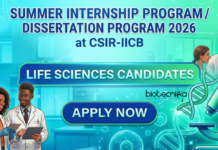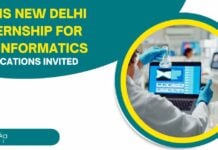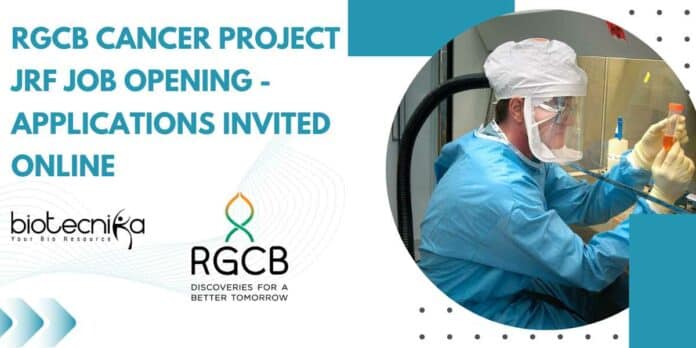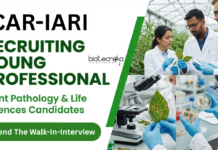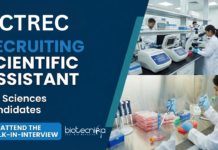RGCB Cancer Project JRF Job Opening – Applications Invited Online
RGCB Cancer Project JRF Job Opening – Applications Invited Online. Looking for exciting opportunities! for Junior Research Fellow at RGCB, check out all the details given the same below
This job expires in
#Adv. # 26/2023
Applications are invited from suitable candidates for one position of Junior Research Fellow in a SERB funded research project entitled “Evaluation of the E3-ligase independent function of Transcription Intermediary Factor1y (TIF1y) in the regulation of cancer stem cells” in the laboratory of Dr. Tessy Thomas Maliekal at Rajiv Gandhi Centre for Biotechnology, Thiruvananthapuram.
Job Role: Junior Research Fellow
No. of Posts: 01
AGE: Below 28 years as on August 24, 2023. Age relaxation will be given as per Govt. of India norms.
DURATION: Initially for a period of one year and extendable for three more year or till termination of the project whichever is earlier based on performance evaluation on yearly basis.
SELECTION PROCESS
- Applications should be submitted online.
- Candidates who are currently working in Government firms should send applications through proper channel.
- Last date for receiving completed applications is August 24, 2023
- If a candidate wishes to apply for different positions, separate applications should be submitted for each position. Selection to the position will not entitle the candidate to any future positions at RGCB (permanent or otherwise). As with all project positions at RGCB, the position will be co terminus with end of the project.
Applications which are not in the prescribed format will summarily be rejected.
Only those fulfilling the above criteria need to apply. Applicants will be short listed for the ONLINE selection interview based on eligibility criteria. Selection of suitable candidates will be made based on qualifications and performance in the selection interview.
ESSENTIAL QUALIFICATIONS
- The candidates should have a Post Graduate Degree in Basic Science OR Graduate / Post Graduate Degree in Professional course.
- The Candidate should have qualified National Eligibility Test – CSIR-UGC NET including Lectureship (Assistant Professorship) or Graduate Aptitude Test in Engineering (GATE)/ or National Level Examination conducted by Central Government Departments and their Agencies and Institutions viz., DBT- Biotechnology Eligibility Test/ Joint Graduate Entrance Examination for Biology & Interdisciplinary Life Sciences (JBEEBILS)/ ICMR Entrance Exam/ Approved DST Inspire Fellowship, DAE, DOS, DRDO. MHRD, ICAR, ICMR, IIT, IISc, IISER etc.
DESIRABLE QUALIFICATIONS:
Experience in Mammalian cell culture, FACS, Immunofluorescence, Immunohistochemistry, PCR and Molecular Cloning.
EMOLUMENT: ₹ 31,000/- + 16% HRA per month for first two years and ₹ 35,000/- + 16% HRA per month for the third year.
Possible interview questions may be asked for Junior Research Fellow at RGCB
1. Can you tell us about your research experience and the projects you have worked on in the past? Answer: Certainly! During my academic journey, I have actively participated in various research projects. One of the notable projects was focused on understanding cancer stem cells and their regulation. I gained experience in mammalian cell culture, FACS, immunofluorescence, PCR, and molecular cloning, which aligns well with the requirements of this position. These experiences have sparked my interest in cancer research, and I am excited about the opportunity to contribute to the “Evaluation of the E3-ligase independent function of Transcription Intermediary Factor1y (TIF1y) in the regulation of cancer stem cells” project.
2. How familiar are you with techniques like FACS, Immunohistochemistry, and PCR? Could you share a specific example of how you utilized these techniques in your previous research? Answer: I am well-versed in FACS (Fluorescence-Activated Cell Sorting), Immunohistochemistry, and PCR (Polymerase Chain Reaction) techniques. In a previous project, I utilized FACS to isolate specific cell populations, such as cancer stem cells, from heterogeneous samples. Immunohistochemistry was employed to visualize the expression of specific proteins in tumor tissues, providing valuable insights into the cellular localization of the proteins of interest. Additionally, PCR played a crucial role in analyzing gene expression patterns, which helped us understand the molecular mechanisms underlying cancer stem cell regulation.
3. How do you plan to contribute to the research project “Evaluation of the E3-ligase independent function of Transcription Intermediary Factor1y (TIF1y) in the regulation of cancer stem cells”? Answer: I am eager to contribute significantly to this research project. My expertise in mammalian cell culture and molecular techniques will enable me to perform experiments related to TIF1y and its potential role in cancer stem cell regulation. I plan to conduct in-depth immunofluorescence studies to explore the cellular localization and interactions of TIF1y. Additionally, I aim to employ PCR-based approaches to investigate changes in gene expression upon TIF1y manipulation. Through these efforts, I hope to shed light on the E3-ligase independent function of TIF1y and its impact on cancer stem cell biology.
4. How do you handle challenging situations in the laboratory, such as technical difficulties or unexpected results? Answer: In the laboratory, encountering challenges is inevitable. I tackle such situations with a systematic approach. Firstly, I carefully assess the experimental setup and troubleshoot technical issues. If needed, I seek advice from mentors or colleagues to brainstorm potential solutions. I also keep detailed records of my experiments to identify any inconsistencies. In the face of unexpected results, I remain open-minded and consider them as opportunities for further investigation. By maintaining a positive and persistent attitude, I strive to overcome challenges and achieve meaningful outcomes.
5. What interests you the most about cancer stem cell research, and how do you envision your future career in this field? Answer: Cancer stem cell research fascinates me because it holds the key to understanding the driving force behind tumor initiation, progression, and therapeutic resistance. Studying cancer stem cells provides a unique perspective on tumor heterogeneity and therapeutic targeting. I envision my future career as a dedicated researcher in cancer biology, specifically focusing on cancer stem cell biology and targeted therapies. I aspire to contribute to the development of innovative approaches to combat cancer and improve patient outcomes. This JRF position at RGCB presents an excellent opportunity for me to further develop my expertise and make meaningful contributions to the field of cancer research.
Editor’s Note: RGCB Cancer Project JRF Job Opening – Applications Invited Online. Please ensure you are subscribed to the Biotecnika Times Newsletter and our YouTube channel to be notified of the latest industry news. Follow us on social media like Twitter, Telegram, Facebook









